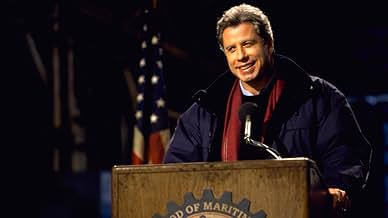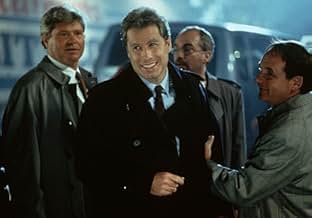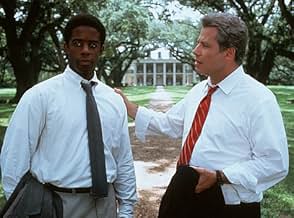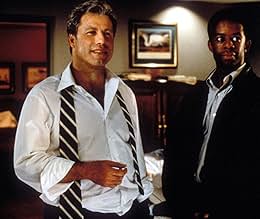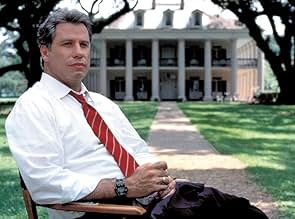VALUTAZIONE IMDb
6,7/10
30.888
LA TUA VALUTAZIONE
Aggiungi una trama nella tua linguaA man joins the political campaign of a smooth-operator candidate for President of the United States of America.A man joins the political campaign of a smooth-operator candidate for President of the United States of America.A man joins the political campaign of a smooth-operator candidate for President of the United States of America.
- Regia
- Sceneggiatura
- Star
- Candidato a 2 Oscar
- 10 vittorie e 31 candidature totali
Recensioni in evidenza
Having heard the book was an unbridled attack on Clinton, I was afraid this film would be the same, but it wasn't. "Primary Colors" was definitely better than I thought it would be.
First, there was Elaine May's script: Funny, well-written, lean, tender at moments, never taking things to the camp level, like so many modern Hollywood movies do when it doesn't work. And it wouldn't have worked for this movie. The thing that kept me watching was that, like Henry, I *did* believe in Jack Stanton, or at least I wanted to. The tender moments, like those at the beginning in the literacy class, kind of endeared me to the Stanton character and made me understand how Burton was drawn in so irrevocably.
Then, there was the acting: marvelous. Travolta, Thompson, Bates: need I say more? Thompson's underlying, clipped accent adds a brittle note to her delivery that fits right in with Susan's repression and humiliation. Travolta was just nice enough to make you believe in him (although, in my opinion, he was ultimately unable to fully portray that "je ne sais quoi" that Clinton possesses, which makes him so charming to many). Bates was riveting and harrowing as the faded liberal clinging to her ideals.
But in addition to the "name actors" there were others who were fantastic: Adrian Lester, as the tortured campaign aide, wants to believe but feels unsure of Stanton's worth as a candidate. Maura Tierney (best known as the wife in "Liar Liar") as the bubbling, funny sidekick to Lester (probably based on Dee Dee Myers), lights up every scene she's in. Larry Hagman, in a wonderful cameo, plays Stanton's opponent and his foil in the morals department.
Billy Bob Thornton plays the James Carville role, and I wasn't sure what he added to the film. Since I constantly compared his character unfavorably to James Carville (the Thornton character was shown as a real rotter, sexually harassing aides, etc.), I'm not sure if my dislike of Thornton was more my dislike of his character than that of his acting.
The production of this film also added to its wonderful feel: the Governour's Mansion, the local ribs place, the constant red/white/blue theme (sometimes it seemed like a Kieslowski film), all of it added to the ambiance. I was not surprised to learn that the Michael Ballhaus, the cinematographer, also filmed the sumptuous "Age of Innocence." Quality tells.
Mike Nichols's directing was also effective: in one especially harrowing scene, Emma Thompson's tormented face fills up the foreground, while Bates's character (in the background) rips into the Stantons' morals. I almost felt like I was at the theater.
This film made me think about Clinton as well as politicians in general. What is admirable, what is not acceptable, what is it we really *want* in our public officials? I don't think "Primary Colors" will change anyone's opinion of the Clintons (in the final analysis, it isn't about them at all) -- but it is a very funny as well as thought-provoking look at modern American politics.
First, there was Elaine May's script: Funny, well-written, lean, tender at moments, never taking things to the camp level, like so many modern Hollywood movies do when it doesn't work. And it wouldn't have worked for this movie. The thing that kept me watching was that, like Henry, I *did* believe in Jack Stanton, or at least I wanted to. The tender moments, like those at the beginning in the literacy class, kind of endeared me to the Stanton character and made me understand how Burton was drawn in so irrevocably.
Then, there was the acting: marvelous. Travolta, Thompson, Bates: need I say more? Thompson's underlying, clipped accent adds a brittle note to her delivery that fits right in with Susan's repression and humiliation. Travolta was just nice enough to make you believe in him (although, in my opinion, he was ultimately unable to fully portray that "je ne sais quoi" that Clinton possesses, which makes him so charming to many). Bates was riveting and harrowing as the faded liberal clinging to her ideals.
But in addition to the "name actors" there were others who were fantastic: Adrian Lester, as the tortured campaign aide, wants to believe but feels unsure of Stanton's worth as a candidate. Maura Tierney (best known as the wife in "Liar Liar") as the bubbling, funny sidekick to Lester (probably based on Dee Dee Myers), lights up every scene she's in. Larry Hagman, in a wonderful cameo, plays Stanton's opponent and his foil in the morals department.
Billy Bob Thornton plays the James Carville role, and I wasn't sure what he added to the film. Since I constantly compared his character unfavorably to James Carville (the Thornton character was shown as a real rotter, sexually harassing aides, etc.), I'm not sure if my dislike of Thornton was more my dislike of his character than that of his acting.
The production of this film also added to its wonderful feel: the Governour's Mansion, the local ribs place, the constant red/white/blue theme (sometimes it seemed like a Kieslowski film), all of it added to the ambiance. I was not surprised to learn that the Michael Ballhaus, the cinematographer, also filmed the sumptuous "Age of Innocence." Quality tells.
Mike Nichols's directing was also effective: in one especially harrowing scene, Emma Thompson's tormented face fills up the foreground, while Bates's character (in the background) rips into the Stantons' morals. I almost felt like I was at the theater.
This film made me think about Clinton as well as politicians in general. What is admirable, what is not acceptable, what is it we really *want* in our public officials? I don't think "Primary Colors" will change anyone's opinion of the Clintons (in the final analysis, it isn't about them at all) -- but it is a very funny as well as thought-provoking look at modern American politics.
I thought "Primary Colors" (1998:***) was pretty good. It appears to be a lot easier on "Jack Stanton," the Clinton surrogate played by John Travolta, than the book reportedly was. The movie presents "Stanton" as flawed but essentially decent (at least as decent as any politician running for high office can be). Travolta's imitation of Clinton is OK for a "Saturday Night Live" sketch, but it sometimes gets in the way of his performance over the 2-1/2 hour length of the film. However, he's often effective, and Emma Thompson is first-rate as "Susan Stanton", by turns pragmatically worldly-wise and fiercely supportive. Actually, the focal point of the film is not that of the Stantons but the young, black grandson of a highly regarded civil rights leader, who gets sucked into Stanton's roller-coaster campaign and has his idealism sorely tested. He's well-played by an actor named Adrian Lester. There are also great turns by Kathy Bates, Larry Hagman and Billy Bob Thornton, among many others.
For me, the only big drawback of the picture was the melodramatic suicide of a key player in the drama (I won't say who). I thought it was something this particular character would never do. Otherwise, "Colors" is absorbing and funny and moving nearly all the way. Good moment: The Stantons do a "60 Minutes"-like reaffirmation of their marriage, but as soon as the cameras are turned off, she yanks her hand out of his in a flash.
For me, the only big drawback of the picture was the melodramatic suicide of a key player in the drama (I won't say who). I thought it was something this particular character would never do. Otherwise, "Colors" is absorbing and funny and moving nearly all the way. Good moment: The Stantons do a "60 Minutes"-like reaffirmation of their marriage, but as soon as the cameras are turned off, she yanks her hand out of his in a flash.
Now that the Monica Lewinsky/Bill Clinton circus has played itself out, I finally saw Elaine May's excellent, under-appreciated rendering of the tale of a thinly disguised American politician and his campaign to become President of the United States. The performances in "Primary Colors" are remarkable. John Travolta does an astonishing impersonation of Clinton without being a Saturday Night Live caricature. Emma Thompson is perfect as his long-suffering wife, always waiting for the other shoe to drop revealing his indiscretions. Kathy Bates deserved her Academy Award nomination as his public relations trouble-shooter. Her not quite over-the-top performance is the heart of this opus. Last, but not least, Adrian Lester is the idealist young African American in charge of his campaign. This impassioned portrayal bodes well to a successful future in films. Mike Nichols has directed Miss May's script with intelligence and humor. See it now, after all the gossiping has died down, for an insightful, entertaining glimpse into the world of politics.
The much under-rated Primary Colors represents the zenith of its genre: a consistently excellent political satire armed with a stellar cast, an involving, intricate plot, and some of the finest direction in recent times from the sporadic (yet always reliable) Mike Nichols. John Travolta's portrayal of a Clinton-esquire Southern governor with a weakness for women and doughnuts is note perfect, encapsulating the flawed yet undoubtedly brilliant Jack Stanton with effortless flair and charisma. Travolta is ably supported by English character actors Emma Thompson and big screen debutant Adrian Lester, as well as an Oscar nominated Kathy Bates, Billy Bob Thornton and a resurgent Larry Hagman.
The film is, in essence, a chronology of Stanton's rise of the political ladder and the struggles encountered by his vibrant team in keeping their man in the race, despite numerous setbacks and tragedies along the way. The script gives Travolta a perfect platform to express the very human emotions that both constrain and encourage us: his early speeches (particularly at an adult literacy centre) are punctuated by salient (yet entirely falsified) anecdotes, and were are given equal insight into Stanton the man and Stanton the politician. Thus the film's fundamental paradox arises: the audience is clearly conditioned to sympathise with Stanton as a result of his remarkable eloquence, yet we are frequently undercut by revelations of sex scandals, endless untruths and the often heartless pragmatism he embarks upon. This conflict for the audience is superbly manipulated so that, at the film's conclusion, we are unsure as to what our own emotions should be. Few films manage to pull this off: fewer with the nuanced skill of Nichols' political odyssey.
I want to add a few words about the female performances in the film. Emma Thompson, as the Hilary Clinton of the the cast, nails both the accent and mannerisms of her model with a convincing determination. Her character is often the mediator among the campaign team, yet there is a ruthlessness about her, a quiet conviction in her actions that her husband is clearly sustained by. Kathy Bates is the unhinged lesbian media consultant who is drafted in to nullify the potent threat of negative media reporting. She clearly gets all the best lines (a prize shared with the equally crazy Billy Bob Thornton character) including a memorable reference to Stanton's string of lovers as "sorry trash bins": scrupulous editing on my part here. At the film's conclusion, Bates comes to the fore, spelling out the impossible conflict between what is politically right and what is humanly right with an intensity that few actors could accomplish. Her subsequent Oscar nomination was well deserved and she was unlucky to be pitted against a triumphant Judi Dench in the Best Supporting Actress category.
That said, this is Travolta's movie. This is a career-defining performance from an actor unfortunately sullied by a series of mind-numbing duds (Battlefield Earth, anyone?), yet had he chosen his roles more wisely (as, say, Pacino has done) a more creditable media image would most certainly have been forthcoming.
Don't be put off by its subject matter: this is film making at its best and is a credit to its highly talented cast and crew.
10/10
The film is, in essence, a chronology of Stanton's rise of the political ladder and the struggles encountered by his vibrant team in keeping their man in the race, despite numerous setbacks and tragedies along the way. The script gives Travolta a perfect platform to express the very human emotions that both constrain and encourage us: his early speeches (particularly at an adult literacy centre) are punctuated by salient (yet entirely falsified) anecdotes, and were are given equal insight into Stanton the man and Stanton the politician. Thus the film's fundamental paradox arises: the audience is clearly conditioned to sympathise with Stanton as a result of his remarkable eloquence, yet we are frequently undercut by revelations of sex scandals, endless untruths and the often heartless pragmatism he embarks upon. This conflict for the audience is superbly manipulated so that, at the film's conclusion, we are unsure as to what our own emotions should be. Few films manage to pull this off: fewer with the nuanced skill of Nichols' political odyssey.
I want to add a few words about the female performances in the film. Emma Thompson, as the Hilary Clinton of the the cast, nails both the accent and mannerisms of her model with a convincing determination. Her character is often the mediator among the campaign team, yet there is a ruthlessness about her, a quiet conviction in her actions that her husband is clearly sustained by. Kathy Bates is the unhinged lesbian media consultant who is drafted in to nullify the potent threat of negative media reporting. She clearly gets all the best lines (a prize shared with the equally crazy Billy Bob Thornton character) including a memorable reference to Stanton's string of lovers as "sorry trash bins": scrupulous editing on my part here. At the film's conclusion, Bates comes to the fore, spelling out the impossible conflict between what is politically right and what is humanly right with an intensity that few actors could accomplish. Her subsequent Oscar nomination was well deserved and she was unlucky to be pitted against a triumphant Judi Dench in the Best Supporting Actress category.
That said, this is Travolta's movie. This is a career-defining performance from an actor unfortunately sullied by a series of mind-numbing duds (Battlefield Earth, anyone?), yet had he chosen his roles more wisely (as, say, Pacino has done) a more creditable media image would most certainly have been forthcoming.
Don't be put off by its subject matter: this is film making at its best and is a credit to its highly talented cast and crew.
10/10
I was never a big fan of the novel by Joe Klein that this movie is based on. Like Clinton, it seemed more slick and facile than satirical and insightful. There was a good story trying to get out, but it didn't. The movie manages to bring more of that story to the forefront, like the idea that even a nominee with good ideas and good heart needs to do dirty deeds to get elected because of how screwed up the American system is. I think Kathy Bates also deserves all the praise she's been getting, and Emma Thompson, Billy Bob Thornton, and Maura Tierney are also good.
Travolta was a problem. Considering how much the filmmakers tried to distance themselves between their story and Clinton's real-life troubles, this seemed little more than a slick impression, and I found it distracting. I also found missed some of the stuff they cut from the novel, like Thompson's indiscretion with Adrian Lester's character, and the relationship between him and Tierney didn't have the context here that it did in the novel. And again, I was left wondering, "If you hate him that much, why stay?" Overall, an admirable effort, and maybe I'll be more receptive once this whole impeachment garbage fades from memory, but I still found it wanting.
Travolta was a problem. Considering how much the filmmakers tried to distance themselves between their story and Clinton's real-life troubles, this seemed little more than a slick impression, and I found it distracting. I also found missed some of the stuff they cut from the novel, like Thompson's indiscretion with Adrian Lester's character, and the relationship between him and Tierney didn't have the context here that it did in the novel. And again, I was left wondering, "If you hate him that much, why stay?" Overall, an admirable effort, and maybe I'll be more receptive once this whole impeachment garbage fades from memory, but I still found it wanting.
Lo sapevi?
- QuizThen-President Bill Clinton enjoyed this movie so much that he even invited John Travolta to a party, on one condition, he must come as Governor Jack Stanton. Travolta declined.
- BlooperWhen watching the New Hampshire returns, one TV station says that Governor Stanton is still out campaigning on the street until the polls close while the other simultaneously says 15 percent of the vote has already been counted. Votes aren't counted until after the polls close.
- Citazioni
[with a gun in her enemy's crotch]
Libby Holden: I am a gay lesbian woman! I do not mythologize the male sexual organ!
- ConnessioniEdited from Air Bud - Campione a quattro zampe (1997)
- Colonne sonorePrimrose Lane
Written by Wayne Shanklin and George 'Red' Callender (as George Callender)
I più visti
Accedi per valutare e creare un elenco di titoli salvati per ottenere consigli personalizzati
- How long is Primary Colors?Powered by Alexa
Dettagli
- Data di uscita
- Paesi di origine
- Sito ufficiale
- Lingue
- Celebre anche come
- Primary Colors
- Luoghi delle riprese
- Aziende produttrici
- Vedi altri crediti dell’azienda su IMDbPro
Botteghino
- Budget
- 65.000.000 USD (previsto)
- Lordo Stati Uniti e Canada
- 39.001.187 USD
- Fine settimana di apertura Stati Uniti e Canada
- 12.045.395 USD
- 22 mar 1998
- Lordo in tutto il mondo
- 52.090.187 USD
- Tempo di esecuzione2 ore 23 minuti
- Colore
- Mix di suoni
- Proporzioni
- 2.35 : 1
Contribuisci a questa pagina
Suggerisci una modifica o aggiungi i contenuti mancanti

Divario superiore
By what name was I colori della vittoria (1998) officially released in India in English?
Rispondi

